Alsu Sungatullina: ‘National music lives if it is passed down from generation to generation’
The Kazan composer about young talents in the profession, the division of generations and the future of Tatar classical music
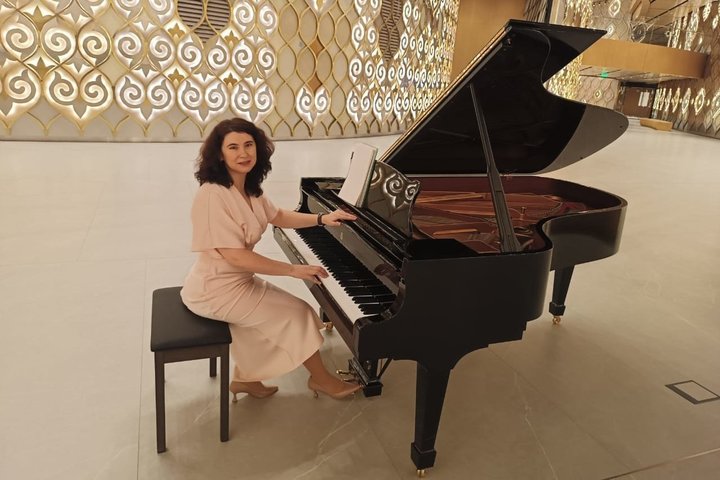
Composer, pianist, laureate of all-Russian and international composition competitions, member of the Union of Composers of Russia and Tatarstan Alsu Sungatullina dreams of creating a Tatar musical children's fairy tale for an orchestra and a reciter. This is a new format for national works. The author of choral and orchestral scores, music for children and youth, works for piano and chamber instrumental ensembles told Realnoe Vremya in an interview about the plot she chose for the fairy tale.
“If not us, then who?”
Alsu, why did you decide to write a musical fairy tale?
I have always really enjoyed writing music for children and I had this idea — to write a children's fairy tale for an orchestra and a reciter, like Peter and the Wolf. I have seen something similar in Russian composers, for example, the fairy tale “The Firebird”. This will be a modern fairy tale with a national flavour, because it is important for me to continue the traditions of my teachers, the Kazan school of composers. If not us, then who?
At the same time, I wanted this music to be accessible and understandable to everyone. I have already found the text, images for the fairy tale. The author's text in prose, it was written not so long ago. It is like a Sufi fairy tale, where there is a simple meaning and a hidden deep meaning. Sufi sages distinguish several levels of understanding. This fairy tale also has a spiritual, moral meaning. I really like it. It seems to me that it can be revealed in music — this is close to me.
Will this be close to the modern generation of children?
Children, in my opinion, are open to everything. I continue to work at the Bakirov Children's Music School No. 6, teaching a composition class. In the spring, we held a creative laboratory, where young composers presented their music in their own performance. For them, this is a big step forward, a big event that they are waiting for. The concert is held at our school, every year we try to invite one of the venerable composers, members of the Union of Composers of the Republic of Tatarstan. Rezeda Akhiyarova, Ilyas Kamal, and this year — Vitaly Kharisov came to us. They all listened to the young composers, told them warm parting words and, in addition, showed them their work, performed their works. It was a creative exchange, which became a big growth for the young musicians.
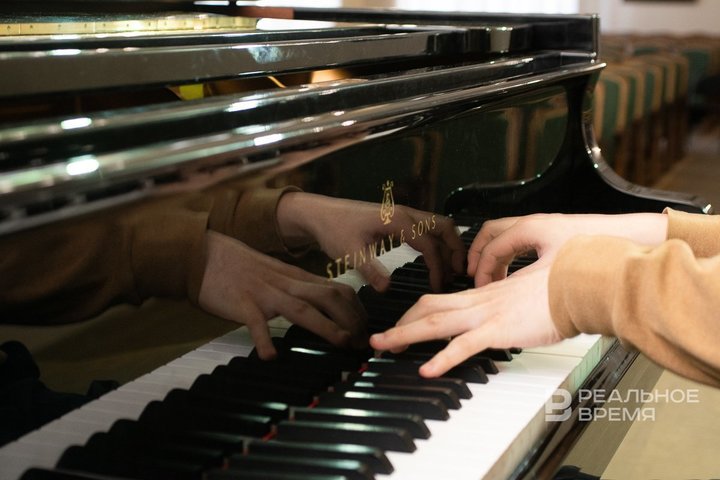
“Children unconsciously write very interesting music”
What kind of children study in the composition class?
Our class has been in existence for three years now, there are 12 students here — boys and girls from 9 to 16 years old. They may not fully realize that they can become composers, for them it is more of a self-expression. These are children who fantasize, feel, for them it is a natural process. They are at an age when they unconsciously write very interesting things. During this time they have already become laureates and diplomats of various competitions. The children learn to play musical instruments (dombra, accordion, piano, violin) and compose music for these same instruments. This is what is close to them.
Are these children interested in national motifs?
Of course, national melody resonates very much with someone. For example, one of the students, Almir Suleimanov, who attends the composition class, writes national compositions that are closest to him. No one tells him to write on the pentatonic scale, he chooses it himself. After all, there is a special technology, and we tell the children about it. For example, if you play on the black keys, you get either Tatar, Chinese or Japanese music. There are little secrets. And for children, everything comes naturally. Some produce music with a Tatar flavour.
Is the new generation interested in classical Tatar music? Can it go beyond music schools and concert halls today?
A music school is a base where talented children can express themselves. But there are also other events, educational projects, and occasions where children can express themselves. I mean competitions and festivals for young musicians. This year, the second Aida Garifullina Republican Competition and Festival was held. The gala concert was held at the Big Concert Hall. A boy named Igor Grechukha studies at our school. He attended a composition class and composed his own music. He was open to modern music. I suggested to his piano teacher that he learn one of my original pieces, Yin-Yang. They took it on with pleasure, learned it, took part in the Aida Garifullina competition and passed the selection. And the organizers chose my piece performed by Igor for the gala concert. It was a dream for this boy to perform at the Big Concert Hall in front of an audience, he played solo on the piano, played a modern composition, the main thing is that he understood it. This was his finest hour. He took first place in his group, in his nomination. We ourselves did not even expect it. It turns out that such venues show children that music is played, that it is in demand. And they become more interested, they understand that it is a part of life. If there were more such events, perhaps more people would be involved in music.
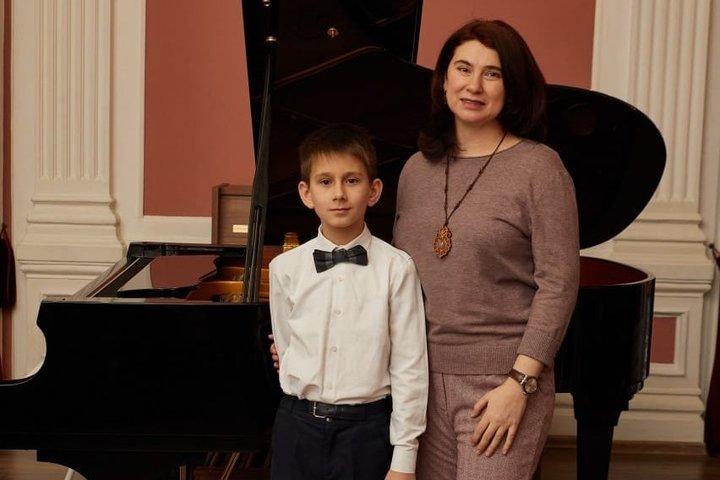
In addition, not only my music was performed at this gala concert, but also the music of other young composers of Tatarstan, and this is great. It turns out that we are involved, and the guys are involved. Names like Aida Garifullina support young musicians.
Since 2017, you have been a member of the Union of Composers of Russia and Tatarstan. What changes do you see in the organization now?
Ilyas Kamal has recently become the head of the Union. A young, but already famous, very active person, a talented musician, cellist, conductor, a wonderful composer himself. He is deeply rooting for the Tatar culture. His sincerity is felt and captivates all the musicians. He supports all of us, composers, both in word and deed.
Since he is also the conductor of the Tinchurin Theatre Orchestra, the orchestra participates in joint events with the Union of Composers. This summer, a unique open-air concert was held in the amphitheatre of the new Kamal Theatre, where a full orchestra participated. This is a new format. To be honest, I don’t remember the music of Tatarstan composers being performed so accessible, at a new venue. I think this is due to Ilyas Kamal.
In addition, the Union of Composers has acquired small studio equipment. This is a recent innovation. We now have the opportunity to record chamber music. The studio was formed under Ilyas Kamal.
An academic composer generally does not work in business, as pop singers do, for example. Indeed, pop singers know how to invest their money and how to recoup it later. But we cannot do this. We don't know these schemes and maybe we don't know how to do it. Our music is of a different kind, designed to develop culture. Only the state can preserve such music. I think that the Union of Composers has the opportunity to record music in a studio, this is already a step forward. Now we can only hope that the quality of the recording will be able to reach a high level.
There is another innovation that we have also been waiting for a long time. Work has begun on the website of the Union of Composers. This has been talked about for a long time and things seem to have started to work. Information about each composer, his work and his compositions will be collected there. We must not forget that the recording on the website must be of good quality, this is what time requires. Old recordings of poor quality are no longer accepted, people do not want to listen to them. It would be great if music was recorded and freely available. We really hope that this website will appear.
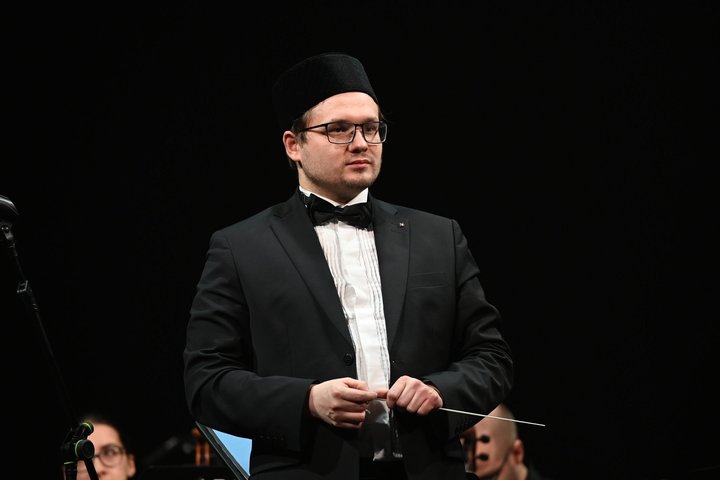
“Classical music can become closer to the people on the stage of the theatre”
You are the author of many works. What is their future fate?
One of the main events of last year was my author's concert, which we called Radiant Kazan. It was held at the National Library of the Republic of Tatarstan. Of course, there were other author's concerts, but this one was special because it was accompanied by an orchestra, which happened for the first time. The orchestra of the Tinchurin Theater under the direction of Ilyas Kamal helped with this, they supported me and almost the entire program sounded accompanied by this orchestra. For me, this is a big step forward. The name Radiant Kazan did not appear by chance. The fact is that my main work is the symphonic piece Radiant Kazan, which was written in 2020 and first performed by the orchestra under the direction of Rustam Abyazov at Miras Tatar music festival in 2023. After the premiere, the composer, of course, worries about his brainchild — how his creative destiny will turn out. And often a lot of time passes from its writing until it begins to live its creative life. I was lucky that this work became one of the winners of the Eduard Artemyev Siberiada competition in 2024 in Novosibirsk.
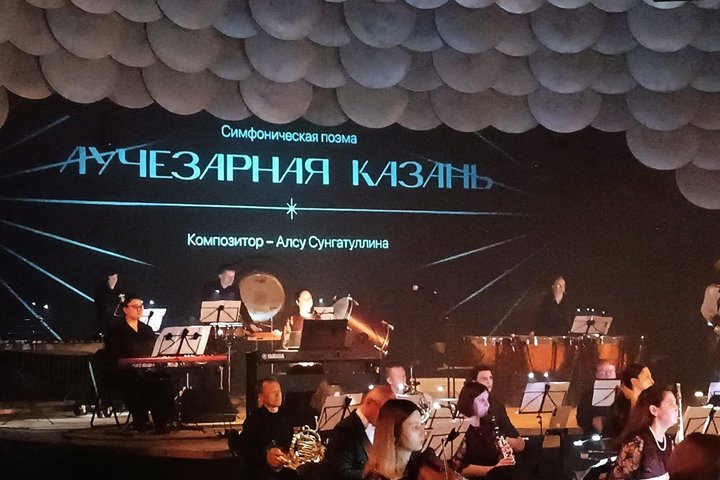
Just recently, on 21 and 22 June, Radiant Kazan was performed again in Kazan. This happened in the new building of the Galiasgar Kamal Theatre in the Eastern Hall. The work was performed by the Kamal Theatre Orchestra under the direction of Daniyar Sokolov. He himself selected the program, interesting works. It included works by classics, for example, the symphonic poem Musa Jalilby Almaz Monasypov, and modern compositions by young composers of Tatarstan were included in the program. It turned out to be such an audiovisual performance. The orchestra plans to continue performing, the project will be called The Melody of Light, will be included in the repertoire and will be available to a wide audience. My work will also remain in the programme, it is a great joy for me to get into the repertoire.
The first date of this concert has already appeared in the theatre’s poster, it will take place on 22 August.
How much does audio visualization help easier perceive classical music?
It allows the viewer to immerse themselves in it more deeply. The video sequence helps to open the world of orchestral sounds. For an unprepared listener, this is more understandable than just coming to a concert hall. There is something in this. This is a new form for people to accept classical music more easily. In general, the theater is a platform that helps to better perceive culture, classical music can become closer to the people there.
“Music is not a museum exhibit”
Is it possible to bring classical Tatar music to the masses and how to do it?
Previously, such music was played on the radio and TV, now this is practically non-existent. Classical music can only be heard on Radio Orpheus and the Kultura channel. I know that the works of Rezeda Akhiyarova, her opera and ballet were recorded and are now played on these platforms. The music is broadcast, and people learn that there is such a composer, there is such original music. I cannot remember any other such examples. It is very difficult to break through to this level. I would like to have something similar at the level of Tatarstan, to be closer to the general public. Perhaps the Kamala Theatre will fulfill this mission. Perhaps the Union of Composers will hold more classical concerts in the open air, where anyone can come, one such concert has already taken place and was a great success. Maybe our music will be heard more on the Black Lake, on Lake Kaban next to the Kamala Theatre.
Music is not a museum exhibit. It is alive, it evolves, changes with us. It is the breath of modernity. And academic music is just as interesting and diverse.
“New is always a risk”
New, changing Tatar music, including classical, can meet resistance from people who prefer traditional sound. Do you encounter this?
This has happened. Once I took part in the Umai opera laboratory. It is a very interesting project. There were three composers, three directors and actors from the Tinchurin Theatre. We wrote short operas, then combined them and showed them all in one evening. It was a bold experiment in both the production and the scenery. I had never seen anything like it in Tatarstan before. I admit, not everything was familiar to me. But as a professional author, I was responsible for my work as a composer, the musical part. I wrote the music responsibly, as I feel it. It was national. But then, having seen this undoubtedly shocking production, people began to say that the music was not national, which I cannot agree with.
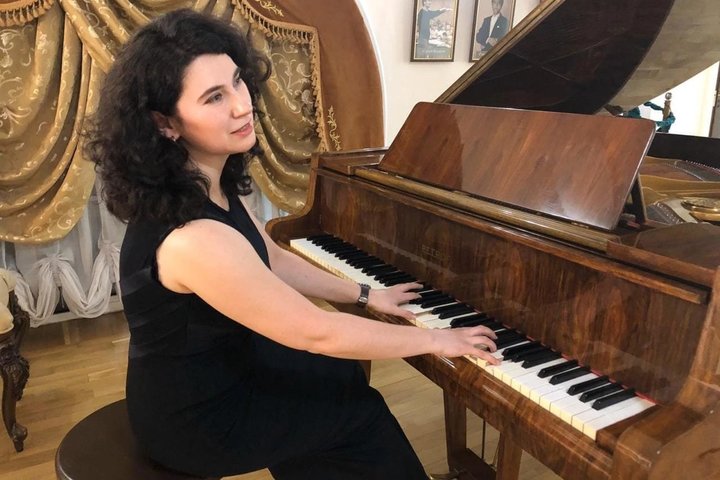
Of course, something new is always a risk. There will definitely be criticism. And creative people take it very hard, they take a long time to recover from it. Perhaps, the next time they are invited to such a project, a sensitive composer or another creative person may refuse, fearing that they will be criticized.
Now I understand that this laboratory gave me a lot of experience, and I do not regret that I took part in it. But at that time they scolded me very much. I regret that these people did not hear the national motives that I put into it. Although the actors themselves came and said: “What beautiful music you have, thank you for the beautiful music!”
That is, there was a very clear division. The young people said: “Oh, how great!” supported me, and the older generation had a different opinion. Even during the show itself, you could hear their indignation from the audience. The division of generations is now very strongly felt.
I agree that something could have been corrected, polished. But sometimes you just need to take a step to move from where you are.
Where do you see the future of classical Tatar music?
In the synthesis of modernity and national intonations. Those who write music in the old way follow an already found style. It has already been complex for years. Our teachers taught us this, and their teachers taught our teachers. We value and cherish this. I myself studied from the scores of Almaz Monasypov, Fasil Akhmetov, Shamil Sharifullin.
But we can no longer write like that. I see that my students are different. If I explain to them in the same language as I was taught, they will not understand and will not continue this link. That is, music must constantly evolve. The national is valuable, but it can only live if it exists in links, passed on from generation to generation. But so that this chain does not break, the tradition needs to be updated. Passing on the legacy to a new generation of students, we must speak to them in a language they understand, consonant with today.